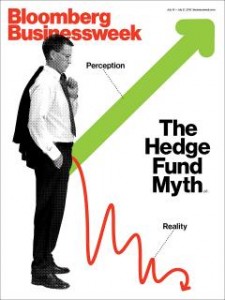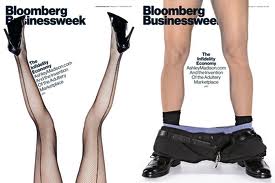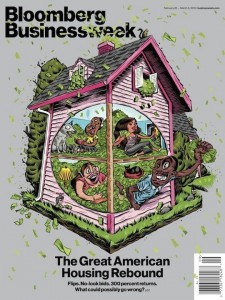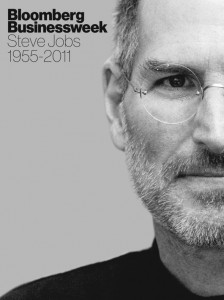 Flouting convention has its uses. An outrageous image can provoke debate, prompt action or, at a minimum, win attention. And all those things are vital to any media organization in our infoglutted age. When so many magazines vie for notice, after all, it takes a lot to grab a reader’s eye on a crowded newsstand, stand out in a towering mail pile or merit a crucial split-second’s notice on a computer screen.
Flouting convention has its uses. An outrageous image can provoke debate, prompt action or, at a minimum, win attention. And all those things are vital to any media organization in our infoglutted age. When so many magazines vie for notice, after all, it takes a lot to grab a reader’s eye on a crowded newsstand, stand out in a towering mail pile or merit a crucial split-second’s notice on a computer screen.
But does that mean sacrificing taste? Sure, Penthouse gets a second glance every time. But will that translate into lasting buzz or just a dismissive, “ah, there they go again?” Does a magazine want to be known as smart and sassy or as juvenile and sassy? What happens to the “smart” when a puerile cover image sullies the book’s impact?
So this brings us to Bloomberg Businessweek. There’s no question the magazine has done impressive work since 2009, when McGraw-Hill sold BusinessWeek after thinning its journalism ranks over several financially troubled years. One would expect no less than excellence from Bloomberg, the preeminent business-news operation of the day. A friend who toils abroad for the news service points out that BB won the 2012 National Magazine Award for General Excellence – the magazine world’s equivalent of the Pulitzer Prize — something the magazine hadn’t done since 1996, an earlier time of superb journalism at BW.
 But one must wonder whether BB has won despite some of its new approaches, rather than because of them. Much of the reporting and writing remains superb – its economic coverage, for instance, has won awards from the Society of American Business Editors and Writers, and I know from serving as a judge that the work was best in class. Some of BB’s contrarian ideas, fleshed out well in text that intelligently challenges conventional wisdom, are compelling. At its best, its work is as good as the best material BW was known for over decades, work that won 10 National Magazine Awards in various categories from 1973-2008, all before the latest general excellence prize. BW and its staffers won a slew of other prizes for foreign and domestic work over those years, too.
But one must wonder whether BB has won despite some of its new approaches, rather than because of them. Much of the reporting and writing remains superb – its economic coverage, for instance, has won awards from the Society of American Business Editors and Writers, and I know from serving as a judge that the work was best in class. Some of BB’s contrarian ideas, fleshed out well in text that intelligently challenges conventional wisdom, are compelling. At its best, its work is as good as the best material BW was known for over decades, work that won 10 National Magazine Awards in various categories from 1973-2008, all before the latest general excellence prize. BW and its staffers won a slew of other prizes for foreign and domestic work over those years, too.
 The risk for BB is that its drive to be edgy, particularly in its cover imagery, could easily thrust it over a cliff’s edge. It could all too easily slip from provocative to prurient, as it has at times already. Disturbingly, the distance from smart to smartass is not all that great.
The risk for BB is that its drive to be edgy, particularly in its cover imagery, could easily thrust it over a cliff’s edge. It could all too easily slip from provocative to prurient, as it has at times already. Disturbingly, the distance from smart to smartass is not all that great.
Already, the editors have had to apologize for the art in a cover piece. They ran a smart housing story, only to have its impact undercut by racial insensitivity in the cover art. At best, the drawing seemed goofy anyway.
BB today, like BW before it, does have to distinguish itself both in its journalism and in the artwork it uses to make its points. And, as my friend from Bloomberg points out, the magazine has been recognized for its design successes by such outfits as Britain’s Design and Art Direction. Apparently, though, what caught the eye of folks at D&AD was one of the more elegant covers, which used a stark and simple photo of Steve Jobs. This seems a case of BB earning recognition for being classy rather than déclassé. That’s something any editor should feel proud of.
 BB has had some impressive successes. It has held onto 4.7 million readers worldwide when so many others have lost the readership battle. It can draw on the work of 2,300 journalists in 72 countries, a couple thousand more journalists and support staffers than BW ever had. If it is to keep up its record of success in readership and influence, the book should work to be known for top-flight economic and business coverage and high-quality artwork that makes the coverage come alive. This is its inheritance, its bloodline. The editors shouldn’t be weighed down by the magazine’s stellar list of alumni and their work as they sort out what to put in the book each week, what imagery to adorn its cover with. But, if they do pause for a second to consider the book’s distinguished history, they might feel a useful nudge in the right direction.
BB has had some impressive successes. It has held onto 4.7 million readers worldwide when so many others have lost the readership battle. It can draw on the work of 2,300 journalists in 72 countries, a couple thousand more journalists and support staffers than BW ever had. If it is to keep up its record of success in readership and influence, the book should work to be known for top-flight economic and business coverage and high-quality artwork that makes the coverage come alive. This is its inheritance, its bloodline. The editors shouldn’t be weighed down by the magazine’s stellar list of alumni and their work as they sort out what to put in the book each week, what imagery to adorn its cover with. But, if they do pause for a second to consider the book’s distinguished history, they might feel a useful nudge in the right direction.
What do the editors, staffers and art folks want the book to be known for anyway? What do they want their legacy to be? Flout convention, sure. Be provocative. Kick up dust. But do it with style and intelligence. A little grace can carry you a lot farther than an adolescent smirk or an unwelcome dollop of snark.
